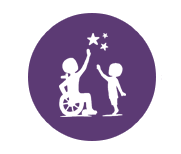.jpg)
Children with Special Educational Needs or Disabilities
Meanwood Primary School is proud to include children with a wide range of needs and abilities. We work very hard, with support from parents and other agencies, to ensure that we meet the needs of every one of our children.
Meanwood's Special Educational Needs and Coordinator (SENCo) is Mrs S Molloy. Mrs Molloy oversees the provision for children with special needs and disabilities throughout the school. Any parent wishing to discuss their child's needs with Mrs Molloy is welcome to make an appointment to do so.
You can email her directly at SMolloy@meanwood.rochdale.sch.uk.

Rochdale's Local Offer
The Local Authority publishes information about how children with special educational needs and disabilities are supported, both directly by council services, and by a wide range of other services and organisations in our locality. Click here to open the Local Offer website.
Independent Advice and Support for Parents
Independent advice and support for parents of children with disabilities or special needs is available from the organisation SENDiass.
For more information please contact Elaine Gansler between 9 am - 5 pm, Monday - Friday on 01706 769634 or e-mail: rochdale.sendiass@barnados.org.uk and you can visit the web page on: Barnados | Rochdale.
Arrangements for the Admission of Pupils with Disabilities
In order that children who have a disability may be catered for, the school seeks advice from the Local Authority regarding the admission of such pupils. The school will endeavour to make any necessary arrangements in full consultation with the parents and any other agencies involved. It may be necessary in some cases for specialised equipment to be purchased, support staff to be employed, and minor adaptations to be made to buildings and furniture. These will need to be done in consultation with the Local Authority, and may take some time to implement.
SEND Information
SEND at Meanwood
About 1 in 5 children nationally have special educational needs at some stage of their school life. Special Educational Needs may be a learning difficulty, a physical disability, difficulties with communication and interaction, or social, emotional or mental health needs. If you, or your child's teacher, think your child has Special Educational Needs, the first thing to do is to meet and discuss all aspects of your child's progress and development.
At this initial stage, the class teacher will try giving your child some extra help in the classroom and may give you some ideas of things to try at home. Your child's progress will be closely monitored to see if the issues are resolved. If after a period of time, there are still concerns about progress, then we will add your child's name to the Special Needs Register and produce a Provision Map. There is absolutely no stigma attached to this; it merely means we are recording and monitoring the additional support your child is receiving.
A new SEN Code of Practice was published by the Department For Education in September 2014. There are no longer the two categories "School Action" and "School Action Plus", instead, they have been replaced by a single category "SEN Support". If your child receives SEN support in school, the progress your child makes will be carefully reviewed by the Class Teacher and the school's Special Educational Needs Co-Ordinator in partnership with yourself. If your child no longer needs additional support, their name will be removed from the Special Needs Register.
Following a period of time at "SEN Support", if a child continues to experience difficulties, the school may ask for some additional advice or support. This could be a specialist from Rochdale Local Authority's Additional Needs Service (RANS) or an Educational Psychologist. Parents/carers are invited to attend any meetings about their child and are always asked to give consent before any assessments of their child are undertaken by professionals from outside school.
A small number of children in school have severe and complex needs which means they may have a "Statement of Special Educational Needs." From September 2014, instead of Statements, children who qualify will be issued an "Education and Health Care Plan". Children who have existing Statements will have them transferred into Education and Health Care Plans by March 2018. This will happen at key transition points at Year 2 and Year 6.
Equal Opportunities for Children with SEND
Steps to prevent disabled pupils being treated less favourably than other pupils.
The school’s Accessibility Plan sets out the Governors’ response to the Equality Act (2010) which requires that a pupil should not be treated less favourably because of a disability.
Existing facilities to assist access to the school by pupils with disabilities.
The curriculum is adapted to meet the needs of all pupils and reasonable adjustments are set in place when necessary. The school has a qualified SENCo and makes effective use of other agencies to support staff training to ensure pupils with disabilities are successfully included in all aspects of school life:
- Accessible toilet and changing facilities in all buildings
- Wheelchair access is available to all buildings
- All children have access to ICT resources such as laptops, recording buttons and headphones to support their learning